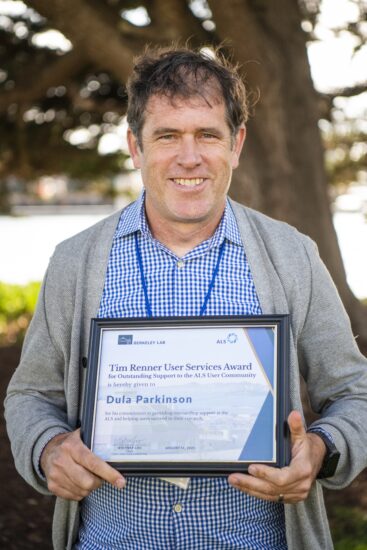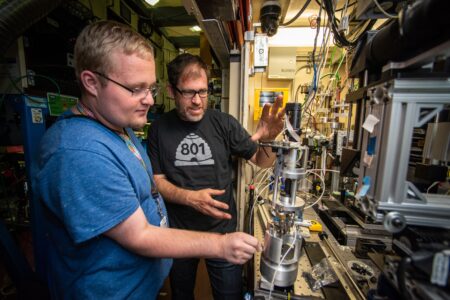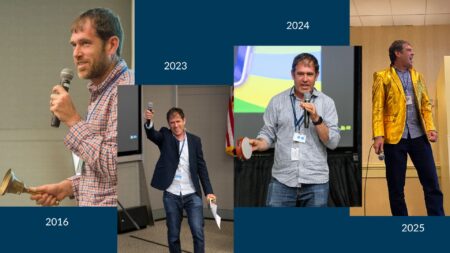by Ina Reichel
“It feels really good,” said Dula Parkinson upon receiving the 2025 Tim Renner User Services Award. “So many people at the ALS are so dedicated to serving the user community, to helping other people succeed. Seeing that has really inspired me to make that my mission too. This award feels like a recognition that I am succeeding at least a little at that mission.”
In celebration of his work, the ALS Users’ Executive Committee presented Parkinson with the 2025 Tim Renner User Services Award “for his commitment to providing outstanding support at the ALS and helping users succeed in their research.”
Improving the beamtime experience for users

Since he arrived at Beamline 8.3.2, Parkinson has been working hard to improve the user experience and has consistently provided excellent user support. Elizabeth Clark witnessed this firsthand as an ALS user and has since joined Parkinson as a beamline scientist at 8.3.2.
“It was a Sunday night in 2022,” Clark remembered. “I was crying at the beamline. I couldn’t collect data and didn’t know why. I got a call from Dula out of the blue who offered to swing by, saying he was ‘in the neighborhood.’ Really? In the neighborhood at 9 p.m. on a Sunday?”
She is pretty sure he checked the logs and saw that she was having problems. But, she accepted his kind offer, and he got her back on track. She successfully collected data for the rest of her shift, resulting in a publication with her as the first author.
Clark’s sentiments were echoed by Florian Chabot, a UC Irvine postdoc who has been working with Parkinson during an ALS fellowship. “Despite his many responsibilities at the ALS, Dula is always finding the time to prepare experiments and enhance the beamline capabilities for our specific needs.” Chabot added, “He is always ready to help with post-experiment analysis.”
In addition to helping individual users, Parkinson has also worked on addressing more global challenges that users at 8.3.2 face. They collect vast amounts of complex data at 8.3.2 but may not always have experience with or access to the computing infrastructure needed to analyze it.
“His vision extends far beyond simply helping users collect data,” said Alex Hexemer, who leads the Photon Science Computing group. “He envisions and collaborates extensively to build a world-class experience that supports users through their entire research workflow,” he explained, describing how Parkinson’s efforts address gaps in users’ technical background or access to computing infrastructure.
Parkinson was a main collaborator on a new and improved workflow that allows real-time data streaming from the beamline to the National Energy Research Computing Center (NERSC) so that users can see a reconstructed image just seconds after taking the data, approximately one hundred times faster than before.
Parkinson enjoys seeing the fruit of that labor. “I love watching users when they see a reconstructed image pop up, and they’re like, ‘Oh…everything makes sense, it’s so obvious now that I can see it.’”
A committed and collaborative mentor

Parkinson doesn’t just care about users. Every year, he mentors a flock of interns and often works with graduate students, postdocs, and other early career scientists.
Working with interns and the ALS doctoral and postdoctoral fellows is a highlight for Parkinson.
“It’s really fun to have these students and postdocs come in with ideas, excitement, and plans that I’ve never thought of,” he explained. “One of the things that’s amazing about the ALS is that interns, students, and postdocs get to interact with all of the other staff and users, just like I do, and they fall in love with working at the beamline.”
Mike Martin, Photon Science Operations group lead, echoed his appreciation for this, describing Parkinson’s impact as “truly transformative.” “Dula’s mentorship of early-career scientists deserves special recognition as a direct service to our user community,” said Martin. “By establishing pathways for meaningful engagement between experienced staff, student interns, and new users, he has cultivated a self-reinforcing culture of knowledge transfer that significantly enhances our operational effectiveness and directly supports new users in navigating the ALS facility,” he added.
Through his intentional mentorship, Parkinson has brought to life the Berkeley Lab stewardship value of team science. “I want my users to experience the magic of team science,” he explained. “They suddenly see, ‘Wow, this whole group of people care about a common goal, they’re helping me in different ways.’”
Generous community building
Parkinson is also the driving force behind the weekly ALS User Forum, more colloquially known as ‘cookie time.’ According to Martin, “this invaluable platform brings together administrative staff, engineers, scientists, managers, postdocs, students, and visiting users and researchers, directly leading to numerous cross-beamline and cross-discipline collaborations that enhance our scientific output and operational efficiency,” explained Martin. “His Thursday gatherings have become a cornerstone of ALS operations, creating connections that formal meetings simply cannot achieve and significantly improving the user experience.”

Parkinson has set a high standard for another recurring event, the annual User Meeting Poster Slam. He provides the opening act for the students and postdocs presenting their posters, energizing the audience for what’s to come.
His enthusiasm and the musical performances he arranges have audiences clamoring for more, so User Meeting organizers keep asking him to emcee the Poster Slam. “As long as they ask me, I’ll come back, because I love doing it,” said Parkinson.
“Like Tim Renner, Dula embodies a caring attitude and has made outstanding contributions for both our users and our staff, consistently going above and beyond to support them,” summarized Martin. “I have had the privilege of witnessing his exceptional and sustained contributions to our scientific community, particularly his profound impact on the ALS user community.”
“Dula’s commitment to the beamline and the users is incredibly motivating and inspiring every day,” finds Elizabeth Clark. “And from each of our own personal experiences at the beamline, I think we can all say that this award is very well deserved.”
Tim Renner was a beamline scientist at the ALS whose battle with cancer cut short a career distinguished by a caring attitude and larger-than-life personality. This award recognizes the services of people across the ALS organization who have made outstanding contributions to the ALS user community.